The Case
A Chinese student was found dead on Sept.30th. The Onondaga County Sheriff’s Office identified 23-year-old Syracuse University student, Xiaopeng Yuan, who was a third year math major in the College of Arts and Sciences, originally from Qingdao, China (originally reported Beijing, but it’s a mistake). His body was discovered behind Springfield Garden Apartments located on Caton Drive on Friday afternoon. Not yet suspects are identified until now, according to the police report from the Sheriff Office.
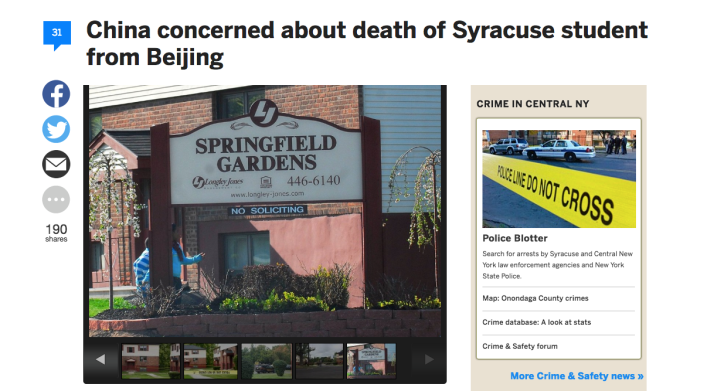
According to Syracuse.com, authorities found Yuan’s car in the parking lot of the complex in DeWitt, a Syracuse suburb. The vehicle, a black Chevrolet Camaro sports car with the license plate “SWAG PIP,” was seen being hauled away Friday.
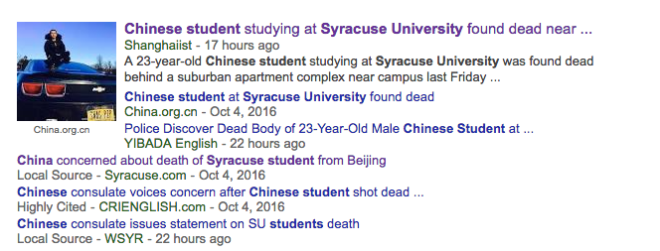
Syracuse University’s Slutzker Center for International Services and the Chinese Students and Scholars Association leaders are preparing for Yuan’s parents arrival to the United States. And police investigation is still going on until now.
Chinese Media Coverage of the Case
Chinese major media like Sina, Tecent and Sohu covered the story several days after the it happened. Quoted from China News Service and USChina Press, they covered the news in Chinese and published on the internet and their Weibo (Chinese Twitter). Besides covering what happened based on the facts that the U.S. media provides, the headlines are much more eye-catching than the U.S. coverages:
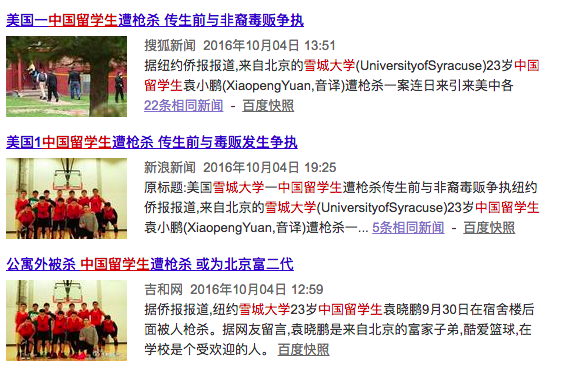
Digging into the sources those media outlets claims they are citing from, the story mentioned that someone said on the internet that Yuan was about to purchase marijuana and ended up fighting with African American drug dealers before he was murdered. Not mentioning too much about what happened on earth of the case, it just revealed Yuan’s personal information and unconfirmed rumors of his death on the internet into the actual news coverage.
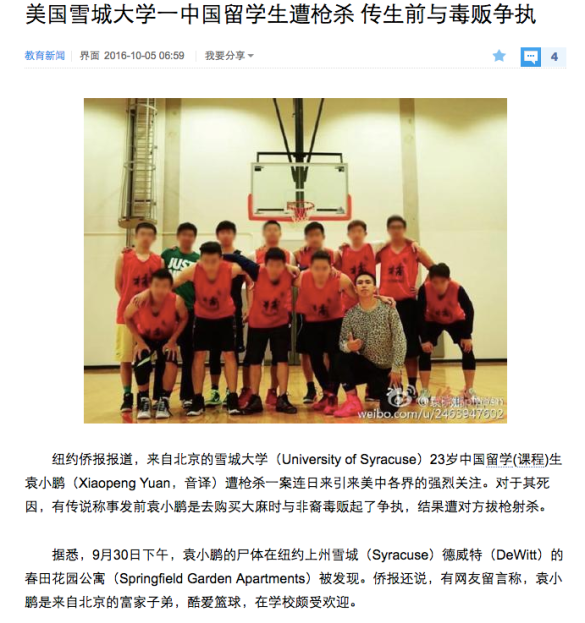
Translation:
According to USChina Press, Xiaopeng Yuan, 23, a Chinese student studying in Syracuse University who originally from Beijing, was murdered. It has been catching eyes from the public for a while, both in the U.S. and China. Speaking of his death, it reported that Yuan was shot dead by African American drug dealers on the way purchasing marijuana.
Yuan’s body was discovered in Springfield Garden Apartments in DeWitt. According to USChina Press, Yuan is a kid from a rich family in Beijing who loves basketball and was very popular in college. (Headline: A Chinese Student from Syracuse University was murdered possibly because of conflicts with drugdealers) – Tecent News

Either Dewitt Police and Onondaga sheriff’s Department has any progress in investigating the case until now and no eyewitness and no suspects have been identified yet. Major media outlets searched through Yuan’s Weibo account and published his photo of a basketball team photo with his Chinese friends that he posted just the day before he was murdered, as well as his photo sitting on top of his Chevrolet.
The Ethical Dilemma
It’s incredibly tricky while covering the stories happened in another country which speaks totally different languages – it is not only the matter of how journalists choose news resources to trust and to translate, also about what wording and phrases they choose to use to publish the story to the targeted readers.
Here raises the main ethical question I really want to talk about: do cultural values shape how media ethically cover stories? In other words, do cultural values affect how journalists make ethical decisions while covering the news?
Here, I am specifically referring to adding tags like“Fu-er-dai”, meaning the second generation rich kids in China. It is not a compliment in China, but saying the targeted person is rich that he acts arrogantly and shows off too much, making people feel he is “the kind of the world”. Why people have resentment to the rich? Partly because the destruction of the planned economy in China has created a massive and widening gap between rich and poor and at the same time a deep seated hatred against the new rich – according to a report in China Daily, a recent survey released by the Zhejiang Academy of Social Sciences found that “96 percent of the public said they feel resentful toward the rich.”
Personally, I believe cultural values have a great impact on how journalists cover the story. Scrolling down the webpage, almost every single headline of the case covered by Chinese media has contained the word “Fu-er-dai”. As a Chinese, I hate to say this, but the truth is, people are always attracted by those “fancy” headlines about sex, crime and the rich – a great amount of media uses these tricks to “fantasize” their headlines by intentionally adding those words or tags to someone they are writing about, no matter it’s confirmed or not- of course, for catching more attentions and making more profit for the news organization. Especially now people use internet to get news rather than newspaper, sometimes people will just read the headline – if the headline can make this person angry enough, he would just leave biased and negative comments without actually reading the whole story.
- Sensationalism
I believe assigning tags like that to any victims is not ethical as a journalist, not to say in this case, those Chinese media are using unconfirmed and anonymous resources from rumors on internet. For news organizations, words like”Fu-er-dai”, “Drugs” or “African-American” might will catch a large group of Chinese audiences – it is fair to say headlines about races, sex, crimes or money do catch people’s attentions than plain ones, but that doesn’t mean journalists can draft the headlines by using speculations and false information.
The priority of media is to tell to the truth and serve the audiences. Adding speculations and unconfirmed information in headlines to sensationalize the story, which triggered both implicit and explicit biases would emerge in people’s minds predicting Yuan must be a bad student or showing off too much which pissed off the murder(s) would actually killed him, is never an ethical decision that the journalists should make when they are covering the news. It concealed how the case is actually going on, namely how police, the university, Chinese consulate and Yuan’s family and friends react in response of this case, which provides the readers biased coverages of the tragic and imposes negative comments of the case.
- News Values
Secondly, it is important for the news organizations to make profits and attract public attentions by good stories, but what journalists should think thoroughly before actually drafting the story is why they need to cover the story – as for a murder case, what’s the balance of the case itself and the background of the victim. Most Chinese media mentioned here, oversimplified how the police investigation and government and family’s reaction to the case while emphasized too way too much on Yuan’s personal information. Until now, there is nothing in progress showing Yuan’s death is rubbery or anything related to drugs dealing as they “indicate”.
The news value of this story shouldn’t be encouraging people to condemn international students or resent so-call rich people, but should be bringing the public attention and regard that a young and hopeful Chinese citizen was murdered by dangerous guys who are still out there taking no responsibility of what they have done.
-
Minimizing Harm
Journalists should minimize harms for the victims by protecting them from being attacked by public opinions. But in this case, these Chinese media outlets are actually bringing the victims more harm by triggering massive public opinions based on their biased coverages.
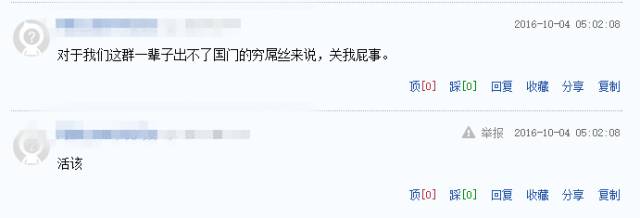

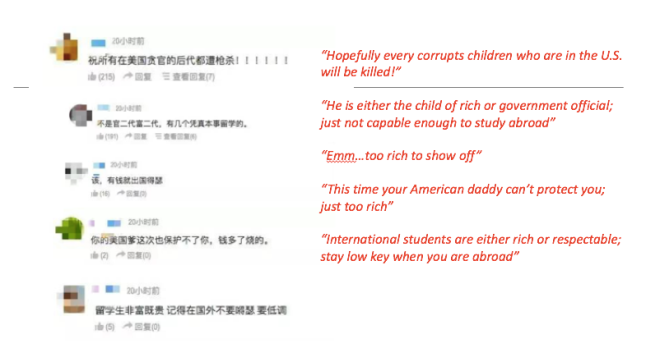
Comments like this flooded on internet and mainly on Weibo.There are negative comments online scolding Yuan and his family even more than feeling sorry for his loss at such a young age. Even worse, those coverage brings tons of harms to Yuan’s family undergoing unimaginable scold criticizes and ridiculous speculations of his death which come from the rumors enhanced by the media.
Because Chinese media consistently put those tags to Chinese student studying abroad every time they cover stories like this, the general public has formed a stereotype that all students studying abroad are either “rich or show-off” – whatever they encountered is just what should happen to them. While media should be accountable and transparent to explain what happened to the victim thoroughly but do not spice up the situation into another level of social gap between different groups of people.
- Ethical Coverage
Not to say all the Chinese coverage about this case is negative. Luckily, there is one article explains thoroughly the whole case including the police investigation in local community and interviews with Yuan’s friends and family – I think it is much more ethical regarding the distribution of the case and Yuan as a victim which provides the readers a full image of what happened and what’s going on. And at the same time, just published one day later than other articles, the reporter does a background research of Yuan by making phones to his parents and contacting with Yuan’s close friends and get confirmed that he is from Qingdao and was born into a well-to-do family to dispel the rumors of “Fu-er-dai” and speculations of his death.
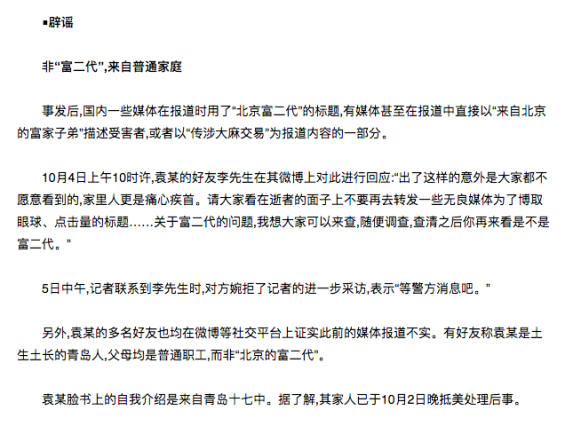
Partial Translation: “Not a ‘Fu-er-dai, but from a well-to-do family'”
On Oct. 4th, Yuan’s close friend Li posted on his Weibo: “No one wants to see what happened to him, not to say his family. Please do not repost those sensationalized stories about him being a ‘Fu-er-dai’ anymore – do some research and you will know he is definitely not.”
According to Yuan’s Facebook, he graduated from Qingdao No.17 High School and several friends have also confirmed that he is not a rich kid from Beijing and condemn the unethical and false stories about Yuan’s death.
The Follow-ups

Until today, there is still no follow-ups on news or updates from the police. I tried to reach out the police department of Syracuse University but they said they are on subordinate position of this case and shouldn’t comment or reveal anything other than what have been reported. Yuan’s parents have also arrived in the U.S. days ago to assist in the last duties to their son. They have made an announcement to condemn the unethical coverage of their son and reiterate their wish of get the suspects in custody as soon as possible.
In a statement issued Tuesday, the Chinese consulate in New York said it had received assurances that local authorities “attached great importance” to Yuan’s case. Officials “also requested that the police ensure that the personal safety and legitimate rights and interests of Chinese students not be infringed,” the statement said.
Discussion

As a journalism student and a Chinese student studying abroad myself, I was shocked by how Chinese media portraits cases like this almost in same format that the victims deserved because either they are rich kids with great cars or predict them showing off too much. The resentments that the media use to sensationalize the story, which in return, these stories sharpened these resentments and social disputes about the rich or students studying abroad. Few questions to think about:
- How do you think tagging victims or perpetrator within cultural contexts? Is that ethical or not? (purposely point out someone is rich, or African-American, or sex-offender, words which are really sensitive and controversial within one culture)
- If you are the journalist, how will you draft the headline which is attractive and ethical to the U.S. audiences/Chinese audiences?
- What kind of cultural values have you noticed shaping coverage in the U.S. or any other countries?
- What do you think the role of media in murder cases like this should be? How to act ethically to achieve that goal?
- In terms of journalism ethics, What is the most important part for covering murder cases like Yuan’s case?
For the first question:
Personally, I think it’s fine to reveal the race of victims and perpetrators. Although the headlines about African-American drug dealers sounded a little racist to me, like they’re intentionally trying to tell the population to stay away from African-Americans, but I could be wrong.
If someone is a convicted sex-offender, I don’t have a problem with that either (especially from what we’ve discussed in class about Brock Turner as a swimmer, even though the story being covered has nothing to do with swimming).
I wouldn’t talk about someone’s wealth. I think calling the victim a “Fu-er-dai” and posting pictures of him on top of his car is really unethical, I’m pretty sure they did it to sensationalise the story and they’re not thinking about their responsibility of minimizing harm. Like you said, the media portraying him as this wealthy student showing off his cars, etc. only adds to the resentment towards rich people. Usually when I read a tragic story, I feel that the way they shape the story is to make me feel sorry for the victim, rather than prompting me to say “he deserve it,” so obviously they’re missing the compassion here.
LikeLike
This was a very interesting case to read about, since I don’t typically read international organizations so I was unaware of what Chinese media is like. I agree with you that the coverage of his death was unethical, especially by slapping a biased characteristic (and unproven) to his name and suggesting that he was caught up in drugs, when none of the information is confirmed. If that happened in the U.S. (which I highly doubt that type of article would go further than a first draft), they would be crucified for their biased coverage but if that’s the norm in China, it’s definitely eye opening how different things are. But it was definitely good that you found the one media outlet that had good and fair coverage of him. You definitely pose some good questions.
LikeLike
Ruobing, like everyone else above commented, this is a great case to analyse how cultural values can potentially affect how the media covers certain stories. Obviously as media consumers and readers, we don’t want to think that news organisations have an agenda by using headlines to reflect this, but I do think that certain cultural values make their way into how we read into stories by the language used. Headlines, the lede and the kicker all contain language that encourages certain angles of an idea but I’m not sure if this is entirely intentional. This would defy the guiding principles of fairness which would be troubling – offering a biased conclusion as opposed to a suggestion of facts.
However, your analysis of how “fu-er-dai” used in the Chinese reports is a great example of how inclusions of certain colloquial vocabulary does play a role in our understanding of (criminal) events. There is definite truth to the fact that Chinese papers push for higher clicks and reads by the mass population, so it can be said these sensationalised business models are indirectly affecting the content that is produced. I am curious to see if there were any more conservative reports by the Chinese papers regarding Xiaopeng’s case. All in all, you raise a very good point.
LikeLike